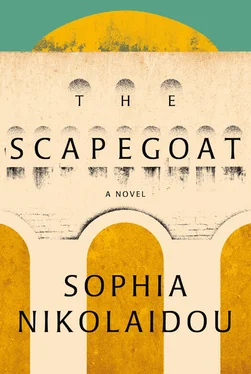Perhaps most important are not the details of these historical settings, but the sense of history as a lived present that saturates the novel. In putting the story of Manolis Gris alongside the current crisis in Greece, Nikolaidou implicitly argues that the injustices of the past are still with us, and that scapegoating of all kinds — of political opponents, of immigrants, of the youth who will bear the brunt of the current financial crisis, even of Greece itself within the European Union — pervades the current moment.
Thodoros Papaggelis stood by my side from the first draft of this book to the last. I thank him for the words, the thoughts, and the love he has shown me. Edmund Keeley, Yiorgos Anastasiadis, Grigoris Staktopoulos, Yiorgos Kafiris: their books provided fuel for the writing of mine. Dimitris Tompaidis and Tatiana Halidou supplied me with Pontic words. Most of the graffiti I quote as chapter headings comes from buildings along Agios Dimitrios Street, Armenopoulou Street, on the campus of the Aristotle University of Thessaloniki, on Agia Sophia Street, and on Theogenous Harisi Street. And my students — from the Korais School, the middle and high schools in Kato Poria, the middle schools in Provata, Skouratea, the Pallatidio middle school of Siderokastro, the Music School of Thessaloniki, the Experimental School of the University of Thessaloniki — taught me so much. I thank them all from the bottom of my heart. Eleni Boura is my editor, which is to say my person. I bow before her professional passion.
Sakis Seferas makes my life easier and more fun. Thus, I can write.
TRANSLATOR’S ACKNOWLEDGMENTS
A novel like this one, which involves extensive research on the part of the author, involves just as much on the part of the translator. I thank Sophia Nikolaidou, then, first of all, for giving me cause to delve into moments in Greek history that had been obscure to me — and to revisit the streets and alleyways of Thessaloniki, a city dear to me. I thank her, too, for her generous reading of this translation.
I would also like to thank Evi Haggipavlu for first handing this novel to me so excitedly, for carefully reading over my finished translation, and for the many, many conversations about pedagogy and politics in between; Panayiotis Pantzarelas and Andreas Galanos for always being willing to join an impromptu book club; Dimitris Kousouris for his help with historical details; Amanda Doxtater, Lanie Millar, and Marc Schachter for their truly amazing edits on parts of the book, and for the community of thinkers they have been for me over the past few years; and, as always, David and Helen Emmerich, the most dedicated of editors, whose generosity as parents goes beyond what any child could ever hope for.
1. At the heart of this book is the issue of scapegoating and sacrifice: how is it that individuals and nations end up taking the blame for events that have many complicated causes? Can this ever be justified? The novel explores these questions from numerous perspectives. Were there some you were more sympathetic to than others? Are there any circumstances where convicting an innocent man like Gris could be the right, or best possible, decision, in your opinion?
2. The character of Manolis Gris remains something of a cipher — we learn about him through other characters but never hear from him directly. What do you make of Nikolaidou’s decision to present him in this way?
3. The different female characters of the book have made very different choices when it comes to career and family, and have had very different fates. And, surprisingly, the younger characters are not necessarily more committed to a life outside the home than older characters like Evthalia. What do you think of the choices each individual made, and the results?
4. Minas refuses to consider going to university in part because he’s sick of tests and the effect of testing culture on his education (the pat answers, the hours spent cramming). The value of a college degree in an uncertain economy is a real question for Greek students like Minas, but also for Americans, especially given the cost of higher education. What are your thoughts about an education geared towards tests and a degree? Does it leave students ill-prepared for the real world?
5. One aspect of the book that may be surprising is the student sit-ins at the high school, which are a far more common occurrence in Greece than in American schools. What did you think of the student occupation? Were you skeptical about it, or did it seem like a legitimate form of political protest?
6. In the novel, the charismatic teacher Marinos Soukiouroglou initially seems like a champion of independent thinking and an unconventional approach to education. But that view is challenged when Minas presents his final report on the murder of Jack Talas. How did your understanding of Souk’s character change over the course of the book?












